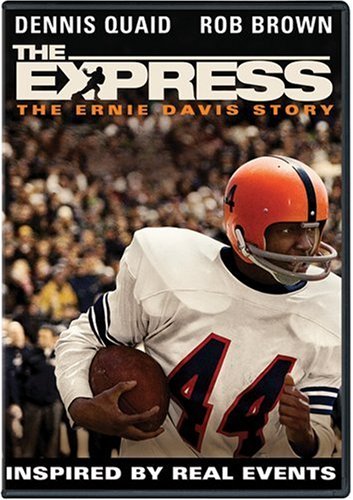All Nonfiction
- Bullying
- Books
- Academic
- Author Interviews
- Celebrity interviews
- College Articles
- College Essays
- Educator of the Year
- Heroes
- Interviews
- Memoir
- Personal Experience
- Sports
- Travel & Culture
All Opinions
- Bullying
- Current Events / Politics
- Discrimination
- Drugs / Alcohol / Smoking
- Entertainment / Celebrities
- Environment
- Love / Relationships
- Movies / Music / TV
- Pop Culture / Trends
- School / College
- Social Issues / Civics
- Spirituality / Religion
- Sports / Hobbies
All Hot Topics
- Bullying
- Community Service
- Environment
- Health
- Letters to the Editor
- Pride & Prejudice
- What Matters
- Back
Summer Guide
- Program Links
- Program Reviews
- Back
College Guide
- College Links
- College Reviews
- College Essays
- College Articles
- Back
The Express: The Ernie Davis Story
The movie The Express: The Ernie Davis Story is a movie about the star running back, Ernie Davis, and how discrimination and racism wouldn’t stop him from becoming the best football player he could be. Because he was able to block these problems out of his mind, Ernie was able to win the Heisman Trophy (college football MVP- most valuable player- awarded before the postseason bowl games), the Cotton Bowl MVP, and get into the NFL, (National Football League). You might think, “Oh look, it’s another movie about how a poor black kid becomes an athlete,” or “Been there done that,” or even “BORING.” But trust me, this movie is worth your time; it’s astounding.
What sets this movie apart from others is that it is a true story. A lot of non-fiction sports films are based on a true story, like Friday Night Lights, but this movie is all true. What happens is that Ernie Davis becomes the first African-American to win the Heisman Trophy in college football. Davis played exceptionally well in 1961, the year he won the trophy. However, Davis was diagnosed with leukemia towards the end of his college career and the beginning of his NFL career, and was not able to play one professional game. As they show in the movie, the Cleveland Browns, a NFL football team, retires his number to honor him.
This film also has a lesson that is stated implicitly. As Ernie was growing up, it was in the 1940s and 50s, there was racial tension between white and black people, especially in the south. When the Syracuse squad decided to play in the Cotton Bowl- a post-season college football game- against the Texas Longhorns, at their stadium, they knew what to expect. The referees would make cheap calls against Syracuse because they had black men on their team. The calls were mainly on Ernie because he was clearly the best player, but he knew not to get frustrated. He let all of the calls go and they ended up winning the game. Ernie did something that a lot of athletes today fail to do: he never let the referees or the calls get the best of him. He would not get himself pulled out of the game. That is a reason why Ernie is still a role model and that is one of the valuable lessons the movie teaches you.
There are lot of non-fiction sports films that show how a young boy becomes a professional athlete, but not many of them show how hard the players work off the field or court. This movie shows how hardworking Davis is. He trains out of practice by running in the snow, rain, cold, and dark, and makes sure that his work is up to date. He was very dedicated to his team and made sure that for each game he gave it his all. In other movies they just show the person growing up and becoming an amazing player through each game. Because Ernie worked hard, he was able to achieve awards, and accomplished many things. He trained himself appropriately; he probably would not have won the Heisman Trophy in 1961 or the Cotton Bowl MVP the year before if he wasn’t as dedicated as he was.
Overall, The Express: The Ernie Davis Story is an enjoyable film. It teaches you a couple of good tips on how to become a sensational athlete. I would give this movie a 4 out of 5 stars because it tends to go overboard and makes it very sentimental. As a result, it is a little hokey. However, it does a great justice to Ernie’s legacy. This movie has also affected many of its viewers because in any sport team sport you play, ignoring bad calls and keeping my head focused on the game will help your team out more than if you get frustrated. Ernie has become a great role model to many kids and teenagers in the country. He shows them that if you put a lot of effort into your dreams, they can come true. This film is a must see if you need advice on becoming a professional athlete or if you want to see a phenomenal movie. Trust me, you will not regret it.
Similar Articles
JOIN THE DISCUSSION
This article has 0 comments.

